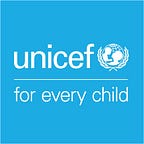The faces of child poverty
Child poverty is about more than just money — it’s multidimensional. For children, poverty means being deprived of major aspects of life like nutrition, health, water, education, protection and shelter. Poverty is a violation of child rights and denies children the chance to survive and thrive — ending it is one of the world’s most urgent tasks.
Abdul (right), 13, works in an informal gold processing facility in the Brong Ahafo region of Ghana, where ore from illegal mines is processed. Child labour in the region is common due to poverty and the lure of quick money.
Relative poverty also impacts children. Even when not deprived in absolute terms, having poorer opportunities in education, health or nutrition than their peers limits a child’s life chances. (Left) Bushra, 16, with her sister in a camp for internally displaced people in Iraq’s Kurdistan region.
Female head porters stand in the shack they share near a market in Ghana. Some as young as 8 years old, head porters are usually migrants from the economically disenfranchised northern regions of the country, earning a meagre living carrying loads on their heads.
Failure to protect children is one of the most costly mistakes societies can make, resulting in low productivity and high unemployment. Boys from the Central African Republic play checkers in a camp for children formerly associated with the anti-Balaka rebel group.
Child poverty travels across generations. Alina, a head porter in a Ghanaian market, does laundry with her son on her back before going to work. Porters like Alina tend to live in slums close to the markets or sleep on the streets — where they are exposed to sexual assault and other crimes.
For children, the effects of poverty ripple through a lifetime. M Dj, 4, is from the village of Loziste in Serbia. His family lives in extreme poverty and cannot afford to take him for a medical check-up and vaccinations, or to enrol him in an early childhood centre so he can start learning.
Children in Nigeria eat a communal meal in a UNICEF-supported safe space in the Dalori camp for internally displaced people. In almost every country in the world, more children live in poverty than adults.
Violence forced Jamila and her family to flee their home, in Iraq. They used an emergency cash transfer, received via a UNICEF programme, to get psychosocial treatment for their son, extra food and clothes. Cash grants and social protection systems play a huge role in taking families out of poverty.
A teacher educates indigenous Wixarica children in Jalisco, Mexico. Too many of the world’s poorest children lack access to public services like health, water and sanitation and electricity, perpetuating discrimination and leaving them further behind in life.
Women in Pakistan attend a skills-training and income-generation project supported by UNICEF. The poorest children often live in marginalized families who are unable to find work. Having decent job opportunities empowers communities and is a key way of lifting children and families out of poverty.
Learn more about the fight against child poverty.
